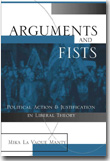The question that animates my research is how to understand the nature of and relationships between political agents and institutions. "Political agency" refers to actors both at the individual and collective level; I try to understand them and their engagements with other actors and institutions. I approach this broad question through applied Kantianism. I treat Immanuel Kant as a social theorist interested in working out the relationship between reasons, ideas, and arguments, on the one hand, and sociologically situated interests and practices, on the other. I use his insights to explore a broad range of "hard cases," that is, cases that challenge ordinary intuitions about political agency.
I have just finished a book manuscript titled "Meaningful Competitions: From Dueling to Doping and Title IX" (forthcoming from the University of Michigan Press). In the book, I study changing arguments about merit, achievement and political status in the development of the modern state. I contrast theories of inherent human equality and dignity with actual social practices, and explore how tensions between liberty and equality get sorted out in such practices. Why did some European middle classes adopt aristocratic customs such as dueling in the late 18th and early 19th centuries, when their ideals would have suggested their condemnation? And why did working-class movements make mass sports part of their politics 100 years later? What is the broader political significance of late 20th century debates about the terms on which previously disadvantaged groups such as women or the disabled get to participate in pursuits of "excellence"?
Recent Publications
(Links may require an institutional subscription.)
- "Dueling for Equality: Masculine Honor and the Modern Politics of Dignity," Political Theory 34:6 (December 2006), pp. 715-740.
- "Bentley, Truman, and the Study of Groups" Annual Review of Political Science 9 (2006), pp. 1-18.
- "Kant's Children," Social Theory & Practice 32:3 (July 2006).
- "Equal Opportunity to Meaningful Competitions: Disability Rights and Justice in Sports," Disability Studies Quarterly (June 2005).
- Arguments and Fists: Political Agency and Justification in Liberal Theory (New York: Routledge, 2002) .
- "Food, Functioning and Justice: From Famines to Eating Disorders" Journal of Political Philosophy 9:2 (2001), pp. 150-167.
Work in progress
- "Ring of Truth: Johnny Cash and Populism" (with Robert W. Mickey, forthcoming in Johnny Cash and Philosophy).
- "American Exceptionalism, part 42: The Case of the Missing Precariat."
- Meaningful Competitions: From Dueling to Doping and Title IX (book manuscript, under contract; link points to a prospectus).
- Nature's New Constraints? Political Theory and the Life Sciences Boom (working paper).
Selected conference papers
- The Hum(e)an Face of Kant's Political Judgment (with Beth Fleishman, for APSA 2004).
- Children as Contraband, Citizens as Cavemen: On Case Selection in Political Theory (WPSA 2002).


